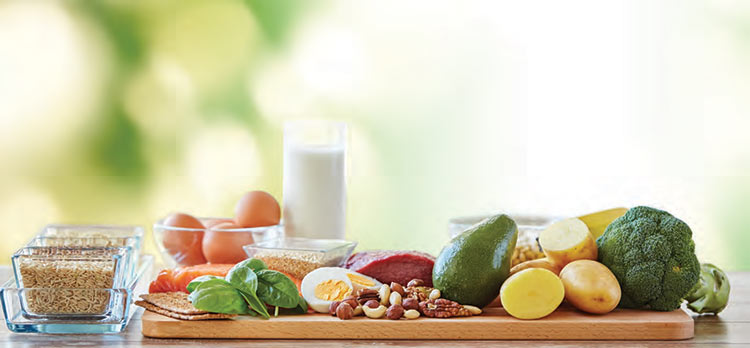Admit it. We’ve all done it.
You clock out of work and midway home you start to ponder what you will fill your dinner plate with. You could swing by the market to pick up some sensible protein and veggies and prepare a nutritious meal, or you could get in the fast food drive-thru line and sneak a few fries in traffic. So often we hear about obesity being on the rise in America. Unfortunately, this affliction impacts 37.9 percent of Americans over the age of 20.
In fact, our diet has an acronym that is pretty depressing in itself. The Standard American Diet, aka S.A.D., often referred to as the “meat-sweet” diet, consists of red and processed meat, butter, high-fat dairy products, eggs, refined grains, white potatoes and sugary drinks. While these foods ingested in moderation are relatively safe, the rate at which they are consumed puts people at risk for a variety of health issues. Weight gain, from eating poorly, can contribute to cancer, heart disease and type 2 diabetes.
We know fatty and carb-filled products are not best for body and mind. Yet we continue to pick the fried over the grilled, the artificial over the natural. But why? Nutritionist- Dietitian, Naturopathic Physician and Integrative Wellness Consultant Dr. Sherri Jacobs, founder of HealthE Coaching, has some thoughts on the reason why we may be reaching for the salt-laden chips.
“I think it is a combination of marketing, cost and convenience,” said Dr. Jacobs, who runs HealthE Coaching with her husband, Stockton. “The processed food industry has spent billions of dollars and many years of research to find specific taste, texture and crunch that tap into our genetic preferences. They know how to create food addicts. Food is no longer nourishment. It is a complex system of chemicals changing brain neurotransmitters. We have mentally, emotionally and physically become addicted to processed food in our culture.”

With football season comes plenty of temptation to want to indulge in traditional tailgating food. However, providing a healthy spread is just as easy as repping your team’s colors. Next time you are in your local market, be on the lookout for options that will raise your spirits, not your cholesterol.
“As consumers become more aware of the health effects of their food choices, companies are coming out with more healthy options to meet demands,” said Dr. Jacobs. “I think it is becoming easier to find alternatives.”
While stepping away from bacon-loaded potato skins and pulled-pork sliders is sometimes difficult, there truly are some great “party-type” foods on the market today that won’t jeopardize your health.
“I suggest organic, non-GMO, corn chips with salsa or guacamole and all-beef, grass-fed hot dogs and burgers,” said Dr. Jacobs. “Consider skipping the bun or using romaine lettuce instead. Cut up fruit and veggies, cheese and rice crackers, roasted nuts and seeds are also great to have on hand.”
While there seem to be more and more healthy options lining market shelves, sometimes it can be hard to make the right decisions without guidance.
“For some people, sugar and carbs are as addictive as alcohol and drugs,” said Dr. Jacobs. “We know there are genetic differences in people causing them to have higher dopamine levels associated with sugar, unable to feel satiated after meals and tendencies to fluctuation in blood sugar levels. All of these genetic differences can increase the likelihood of sugar and carb addiction. I think knowing your genetics is a powerful step because then you know how to influence them for the better. Making food choices that shift your metabolism from sugar burning to fat burning is key to overcoming sugar and carb cravings.”
All too often, people start on a diet but never end up seeing it through. Transforming your eating habits is not something that can necessarily happen overnight. Attempting to cut out a staggering amount of comfort foods can result in you binging later on. That’s why Dr. Jacobs stressed the importance of making little changes daily. Diving right in without a clear plan can cause frustration and ultimately push you further from your dietary objectives.
“Start small with simple changes first. When someone is new to health and wellness and they jump into an extreme diet change, it is often short-lived. Do not make changes to diet and lifestyle unless you know why you are doing it.”
“Set goals and keep them fresh in your mind. Add them to your calendar. Stick them on the fridge,” said Dr. Jacobs.
From whole wheat pasta salad dressed up with pine nuts and sundried tomatoes to toasted pita chips with yogurt mint dip, the number of healthy recipes you can serve on Sundays is vast. Exploring a variety of new healthy foods can be even more rewarding and exciting than chowing down on the usual not-so-healthy options that often dominate sports fans’ tables.
“I recommend keeping frozen veggies and fruits in the freezer,” said Dr. Jacobs. “There will always be times when you do not make it to the market. So having frozen backup is good. We are very particular about the quality of our meats. We buy from a local farm and keep a variety of clean frozen meats on hand. Get used to using herbs in your food. Keep dried and fresh herbs on hand and experiment. Spend money on high-quality sea salt. There are a variety of different-colored salts indicating high mineral content.”
Having nutrient-dense oils for dipping is a great way to boost both flavor and health. Specifically, balsamic vinegar contains polyphenols – antioxidants that can protect the body from heart disease and cancer. The grapes that are used to make balsamic vinegar contain antioxidants that fight against cell damage and improve the body’s immune system.
“Knowing that someone has the knowledge to make different decisions for themselves and their entire family is so rewarding,” said Dr. Jacobs.
As you prepare to cheer on your favorite teams this football season, be mindful of the fare you serve up on game day. In between touchdowns, celebrate your health with snacks that we all can root for.







